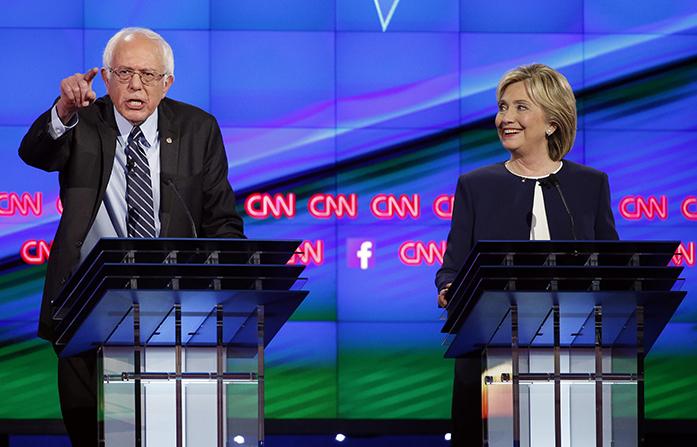On Sunday, South Carolina became the most recent battlefield along the lumbering campaign trails of the Democratic bid for presidency, pitting the three Democratic nomination hopefuls (former Secretary of State Hillary Clinton, Sen. Bernie Sanders, and former Gov. Martin O’Malley) against each other amid the fluorescent red, white, and blue lights and banners of the Charleston location. Given that our beloved and crucially important Iowa caucuses are peeking around the corner, the candidates came to South Carolina prepared to rip each other’s policy to shreds.
The debate brought the ever-controversial issue of gun control into focus, with Clinton ripping into Sanders’ voting history on the issue, leaving him on the defensive.
Clinton set her sights on the Vermont senator and fired accusations of a much-too-relaxed gun policy, bringing to light on the debate floor of his cooperation with the NRA, helping pass a 2005 piece of legislation that granted gun manufacturers immunity from prosecution,
It is the same piece of legislation that Clinton cited the NRA as heralding as “the most important piece of gun-control legislation in the past 20 years.”
Given the setting of the debate, the gun-control issue is weighted. Charleston was the unfortunate scene of the infamous church shooting allegedly perpetrated by Dylann Roof last year. It left nine people dead and provided arguably one of the most convincing recent cases for the need for stricter gun regulation in the United States.
Though, as Sanders stated in his retort to Clinton, he is indubitably the senator of a rural state with relaxed gun-control laws. At what point do congressional members voting histories reflect that of the constituents they are supposed to represent or their personal views, and how do these transfer to the Oval Office?
One could argue that a senator’s adherence to the duty of a representative, voting in harmony with the ideals of those they represent to be an ideological triumph, a picture of a well-oiled representative-democratic machine. But when this vote is juxtaposed with the plague that is gun violence in the United States, morality becomes questioned, and the reactionary abhorrence toward such voting history becomes legitimate.
That said, according to CNN, Sanders announced Jan. 16 his support of a proposed bill to amend the legislation that got his vote more than a decade ago. He reaffirmed his current standing on the issue, contending that small mom and pop shops should not be held liable for the actions of individuals who buy firearms from their businesses, a just provision.
Clinton stated in the debate, “Let’s not forget what this is about; 90 people a day die from gun violence in our country. That’s 33,000 people a year.”
However, that number doesn’t tell the whole story. The majority of those deaths are due to suicides using guns: 63 percent, according to the Centers for Disease Control & Prevention. It’s not the first time Clinton has used this statistic without proper context, and leaving out this information glosses over the issue of mental health as it relates to gun violence and otherwise.
Later in the debate, responding to a question about health care, Sanders said mental-health care would be included in his plan for universal health care in America. While we don’t have the space to discuss the merits of a universal health-care system here, it’s good to see that the estimated 10 million Americans who experience serious mental illness (according to the National Alliance on Mental Illness) wouldn’t be left behind under Sander’s proposal.
The issue of gun control still divides the left and right, and meaningful change is unlikely in our intractable Congress. However, both sides seem to agree that the way our country approaches mental health is woefully inadequate. Hopefully, we can find some middle ground.



